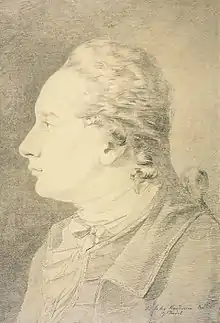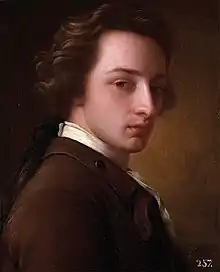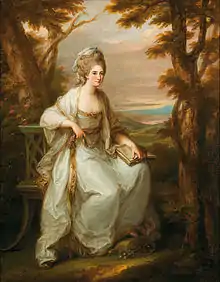Sir John Henderson, 5th Baronet
Sir John Henderson FRSE FSA (8 January 1752 – 12 December 1817), fifth of the Henderson baronets of Fordell, Fife, was a Scottish nobleman and politician. He trained as a lawyer and was also a competent antiquary.

Ancestry
The Hendersons were an ancient Scottish family; James Henderson, who served as Lord Advocate of Scotland and died at Flodden Field in 1513, was called the first "Laird of Fordell". Fordell Castle was built in 1567, but it was built on the site of a previous structure. John Henderson (d. 1683) was created a baronet in 1664.
The Hendersons' considerable wealth came from coalpits on their estates.[1][2]
Life
Sir John Henderson was the son of Robert Henderson (d. 1781), the 4th baronet. He was educated at University of St Andrews and Christ Church, Oxford.
He studied law at St Andrews University graduating in 1764, then did further studies at Oxford University gaining a second degree in 1771 before being made an advocate in 1774.
In 1781, on the death of his father, he became a baronet.
In January 1782 he became a Fellow of the Society of Antiquaries of Scotland.[3]
In 1784 he was elected a Fellow of the Royal Society of Edinburgh. His proposers were Andrew Dalzell, Cosmo Gordon, and John Mortland.[4]
Political career

Henderson served as MP for Fifeshire (1780), Dysart Burghs (1780–84), Seaford (1785-6), and Stirling Burghs (1806-7). Early in his career Henderson was associated with Henry Dundas and supported William Pitt the Younger, but Dundas threw his support to William Wemyss in 1787 and Henderson never forgave him for it. In 1791 he supported his cousin Andrew Cochrane,[5] but in 1796 he campaigned vigorously but unsuccessfully against him. In an effort to keep unfavorable votes from being cast, Sir John Henderson intimidated voters and imprisoned the Provost and some other unfavorable voters.[6][7] Henderson became provost of Inverkeithing from 1791 to 1807.
In 1796 Henderson was one of the backers of the Scots Chronicle, a newspaper opposed to the war policy of the Pitt administration.[8]
In 1802 Henderson contested Stirling Burghs against Captain Alexander Cochrane (later an admiral; brother of Andrew) and both names were returned in a disputed election; Cochrane was ultimately seated.[9] Henderson was successfully returned for Stirling Burghs in 1806 with the support of William Grenville and supported his ministry.[10]
Family

In 1781 he married Anna Loudoun Robertson (d.1782), daughter of General James Robertson, then serving as governor of the Province of New York.[11] Anna Robertson was painted in 1771 by Angelica Kauffman.[12]
His wife died in childbirth of their first and only child, Anne Isabella Henderson (1782 - 1844), who married Admiral Phillip Durham in 1818.[13]
Additional “natural children” were John Francis Wheatley Henderson (1789-), Maria Wheatley Henderson, Emilia Elizabeth Henderson, Charlotte Strickland Henderson, and Robert Strickland Henderson.[14]
Artistic recognition
Henderson commissioned a bust of himself in 1777 by Christopher Hewetson[15] and a portrait by Gavin Hamilton the next year.[16] Henderson's books and artwork seized with the Westmorland in 1778 were featured in a 2012 book and series of art exhibitions.[17] John Brown's 1782 portrait of Henderson is in the Scottish National Portrait Gallery.[18]
References
- Notes on Fordell Railway, built to serve the Henderson coalpits
- Notes on Alice Pit, Fordell Colliery
- Account of the Institution and Progress of the Society of Antiquaries of Scotland, 1792
- Biographical Index of Former Fellows of the Royal Society of Edinburgh 1783–2002 (PDF). The Royal Society of Edinburgh. July 2006. ISBN 0-902-198-84-X.
- Henderson's mother was Isabella Stuart, daughter of Archibald Stuart of Torrance; her sister Jane was Andrew Cochrane's mother.
- A series of original portraits and caricature etchings, Volume 2, Part 2, John Kay, Edinburgh: Hugh Paton, Carver, and Gilder, 1838, p. 400-410
- Henderson, Ebenezer (1879) “ The Annals of Dunfermline and Vicinity” pp. 534-535; Kilrounie (5th ed. 1901) “The Kingdom: A Descriptive and Historical Handbook to Fife” p. 139.
- The Lamp of Lothian; Or, the History of Haddington, Connection with the Public Affairs of East Lothian and of Scotland, from the Earliest Records to the Present Period, James Miller, Haddington: James Allan, 1834, p. 325-8
- The House of Commons, R. G. Thorne, London: Boydell & Brewer, 1986, p. 457
- John Henderson at History of Parliament Online
- Marriage contract (1781) NRS GD172/487, Papers of the Henderson Family of Fordell (GD172); Letter (1782) NRS GD172/493.
- Wikipaintings entry for Lady Henderson's portrait
- The Honourable Henry Erskine, Lord Advocate for Scotland, Elizabeth Cust, London: W. Blackwood & Sons, 1882, p. 372
- Papers relating to provisions for natural children (1817-1821) National Records of Scotland GD172/571, Papers of the Henderson Family of Fordell (GD172); see Societe D’Histoire de Woippy, “1870 Un capitaine woippycien à Sedan … Emile Ambroise HENDERSON” (Nov 2003); Letters (1817-1839) NRS GD172/1102 (regarding legacies from Sir John to John Wheatley Henderson and his sisters); Letter (1820) NRS DG172/1111 (from H. Strickland, mother of Sir John Henderson’s natural children); Letters (1830-1843) NRS DG172/1124 (regarding Emily Wheatley Henderson and Charlotte Henderson, natural daughters of Sir John Henderson); Letters (1831-1844) NRS GD172/1125 (regarding Charlotte Strickland Henderson and Robert Strickland Henderson); Letters (1824-1843) NRS GD172/1120 (from Robert Strickland Henderson, natural son of Sir John Henderson).
- Classical Sculpture and the Culture of Collecting in Britain since 1760, Viccy Coltman, Oxford: Oxford University Press, 2009, plates 11-12
- Brendan Cassidy. A Portrait by Gavin Hamilton: Sir John Henderson of Fordell. Burlington Magazine 158 (2016) 961-63.
- Sánchez-Jáuregui, Maria Dolores, and Wilcox, Scott. The English Prize: The Capture of the Westmorland, An Episode of the Grand Tour. New Haven, CT: Yale University Press, 2012. ISBN 978-0300176056.
- Sir John Henderson of Fordell, by John Brown. 1782. Scottish National Portrait Gallery, Edinburgh.
External links
- Hansard 1803–2005: contributions in Parliament by Sir John Henderson
| Parliament of Great Britain | ||
|---|---|---|
| Preceded by Robert Skene |
Member of Parliament for Fife February 1780 – September 1780 |
Succeeded by Robert Skene |
| Preceded by John Johnstone |
Member of Parliament for Dysart Burghs 1780–1784 |
Succeeded by Sir Charles Preston, Bt |
| Preceded by Sir Peter Parker, Bt Viscount Nevill |
Member of Parliament for Seaford 1785–1786 With: Sir Peter Parker, Bt |
Succeeded by Henry Flood Sir Godfrey Webster, Bt |
| Parliament of the United Kingdom | ||
| Preceded by Alexander Forrester Inglis Cochrane |
Member of Parliament for Stirling Burghs 1806–1807 |
Succeeded by Alexander Campbell |
| Regnal titles | ||
| Preceded by Robert Henderson |
Baronet (of Fordell) 1781–1817 |
Succeeded by Robert Bruce Henderson |